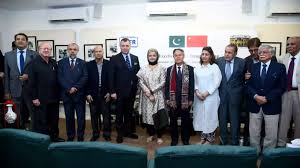Kaja Kallas under pressure to prove diplomatic prowess beyond EU’s eastern flank

Brussels: The EU’s relevance in the Global South could further unravel unless Kallas can show ‘engagement’ on the Israeli-Palestine issue, sources tell Euronews.
Kaja Kallas is facing pressure to prove she has the experience and commitment to steer the European Union’s diplomacy beyond its eastern flank, particularly in response to the war in Gaza, multiple officials, lawmakers and analysts have told Euronews.
Pending a confirmation vote by lawmakers, the former Estonian prime minister is poised to replace Josep Borrell in the EU’s top diplomatic role – the High Representative for Foreign Policy – helming the bloc’s external action in regions including Africa, Asia-Pacific and the Middle East.
But Kallas – an outspoken Russia hawk and a driving force in EU efforts to punish the Kremlin for its invasion of Ukraine – has a limited track record in diplomatic engagements beyond Europe’s eastern flank.
Her support for Ukraine’s resistance has defined her rise to international recognition, while her sparse public statements on Gaza have embraced the EU’s well-rehearsed line on firmly supporting Israel’s right to self-defence while calling for the respect of international humanitarian law in Gaza.
That, combined with the progressive erosion of the decision-making power of the High Representative – who can only act with the unanimous endorsement of all 27 member states – means the EU’s relevance in the Middle East and Global South could further diminish.
Some in Brussels fear Kallas’ term in office will be inevitably centred on the war in Ukraine at the expense of the conflict raging between Israel and Hamas in Gaza, which has exposed unbridgeable divisions between EU capitals and a bitter turf war within the different branches of the Brussels institutions.
“Kallas has reassured EU member states for whom the conflict in the Middle East is important that she will give it priority,” a source with knowledge of the transition in the top diplomatic role, granted anonymity, told Euronews.
“But she lacks the deep, personal engagement Borrell has shown in the Israeli-Palestine issue.”
“Since she (Kallas) hasn’t been so engaged in the topic, I am at least a bit worried that the war in Gaza might not be at the top of her agenda,” Evin Incir, a Member of the European Parliament for the left-leaning Socialists and Democrats (S&D) group, told Euronews.
“The Middle East is trickier (for Kallas). It’s an issue that is a bit further away,” Mika Aaltola, a Finnish Member of the European Parliament, who sits on the foreign affairs committee for the centre-right EPP group, told Euronews. “But Estonia under Kallas has been pragmatic in its stance on the conflict in Gaza.”
Aaltola added that Kallas is a “forger of consensus and has an instinct to stand up for what’s right.”
While some commend Borrell’s efforts to balance the clashing stances of member states on the conflict, others say that regardless of the appointment, the damage that has been wrought on the EU’s reputation in the Middle East and the Global South during his mandate is irreparable.
“Borrell may have enhanced his personal standing but he has barely made a dent in the EU’s declining reputation in the Global South,” EU affairs commentator Shada Islam said. “The EU has lost whatever remaining credibility, clout or influence it had in recent years, and Kallas will hardly be able to change anything at all.”
Two sources with knowledge of the dynamics within the European External Action Service (EEAS) – the EU’s diplomatic arm which Kallas will lead – said that powerful civil servants within the institution’s bureaucracy have aimed to tighten their grip on the EU’s Middle East policy, crippling Borrell’s own efforts to exert diplomatic pressure on the Israeli government.
They explained that under Kallas, more “pro-Israel” decision-makers within the wider executive, including Commission president von der Leyen herself, could wield more influence on the bloc’s response to the Gaza war.
Von der Leyen faced fierce criticism for her immediate response to the conflict when she failed to speak up about the humanitarian emergency engulfing the Gaza Strip.
Her executive’s confused reaction also sparked backlash, such as when Hungarian EU Commissioner Olivér Várhelyi unilaterally announced the EU would suspend all aid to Palestinians, despite the humanitarian catastrophe. The executive back-tracked hours later but Várhelyi was not publicly reprimanded for his actions.
It’s fuelled discontent among communities across Europe, as well as among civil servants who have accused the institution that employs them of failing to uphold its ideals of human rights, peace and the rule of law.
For MEP Evin Incir, Borrell has been a counterbalance to forces within the EU institutions – notably von der Leyen and Várhelyi – that were slow to call out Israeli violations of international humanitarian law.
“I firmly believe that if it wasn’t for the progressive parties of the Parliament and for Borrell, we might have seen an EU that had continued to close its eyes on a two-state solution, not even daring to mention it,” Incir said.
“If it wasn’t for him, we might have taken a totally different path than the one the Union did in the end,” she added.
“Borrell has been successful in spotlighting Israeli violations of international law, but also in the deadlock in decision-making by member states. He’s increasingly publicly frustrated in this regard,” Hugh Lovatt, senior policy fellow at the European Council for Foreign Relations (ECFR), told Euronews.
Among Borrell’s proposals to exert diplomatic pressure on Israel are sanctioning extremist Israeli ministers and convening Israel to discuss its compliance with human rights obligations in the EU-Israel cooperation agreement. He has manoeuvered to table these proposals despite member states’ objections.
“The risk (for Kallas) is not being able to move beyond those statements into effective action, and also not being able to learn the lessons of previous High Representatives in terms of how you deal with the member state dynamics and internal decision-making processes,” Lovatt explained.
If Kallas is to let her support to Ukraine define her mandate, it could also lead to further ambiguity over the famous question, “Who do I call if I want to call Europe?” coined by former US Secretary of State Henry Kissinger.
While von der Leyen is yet to unveil the portfolios that will define the mandate of her next team, she has pledged to appoint a new European Commissioner for the Mediterranean.
It means the current portfolio of Olivér Várhelyi will be split to delineate the so-called ‘enlargement’ countries – both in the Western Balkans and the Eastern flank – from other neighbourhood countries in the Middle East and North Africa.
Amnesty International’s Hussein Baoumi told Euronews in July the decision is a “reflection” of von der Leyen’s double standards in how she views cooperation with the two regions.
“The enlargement group (…) will be more values-driven, seeking to anchor democracy, stability and rule of law,” Baoumi said, “whereas the Commissioner for the Mediterranean will focus more on issues connected to energy, security, migration and quite vague cooperation in areas of mutual interest.”
“For enlargement countries values are very important and these countries should be held to the EU standard, whereas with the Mediterranean these issues take the backseat,” he added. “This is a very clear message that the promotion of human rights, democracy and the rule of law is reserved for a certain group of countries that have a future in the European Union.”
A greater role for the Commissioner for the Mediterranean in the EU’s relations with Middle Eastern countries could mean Kallas’ relevance as an actor in the region being further diluted.





